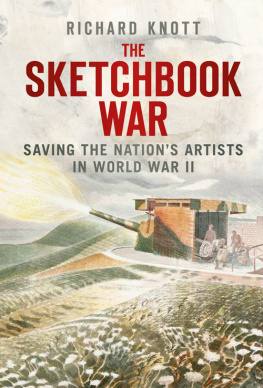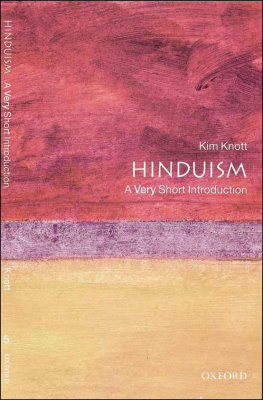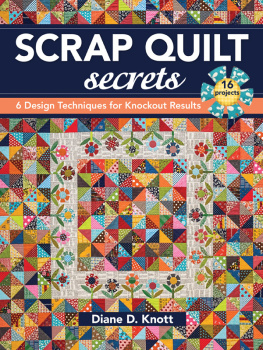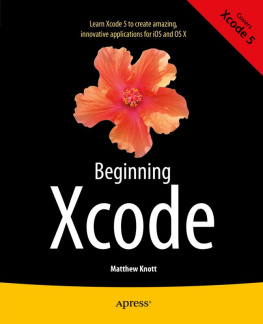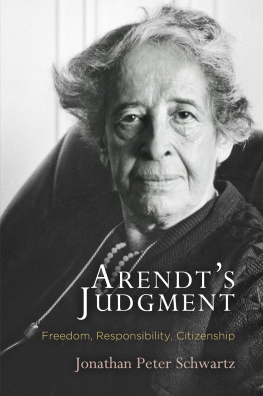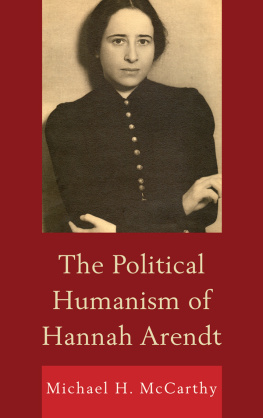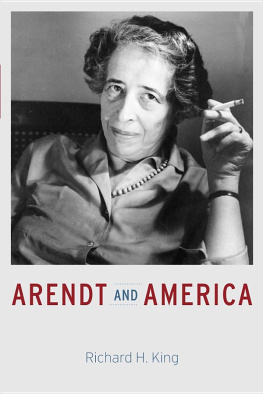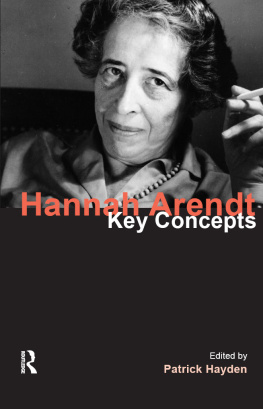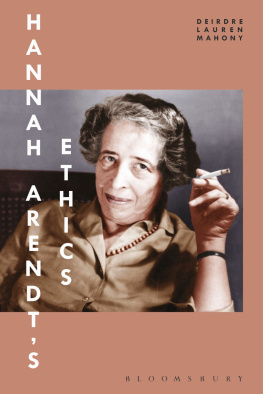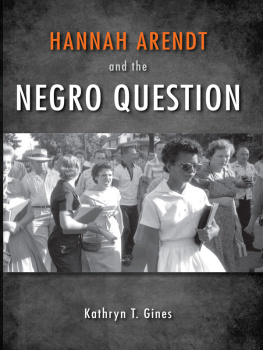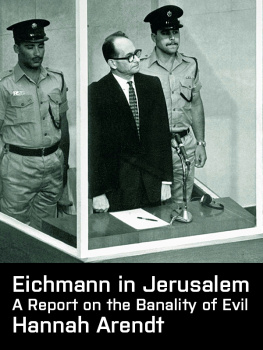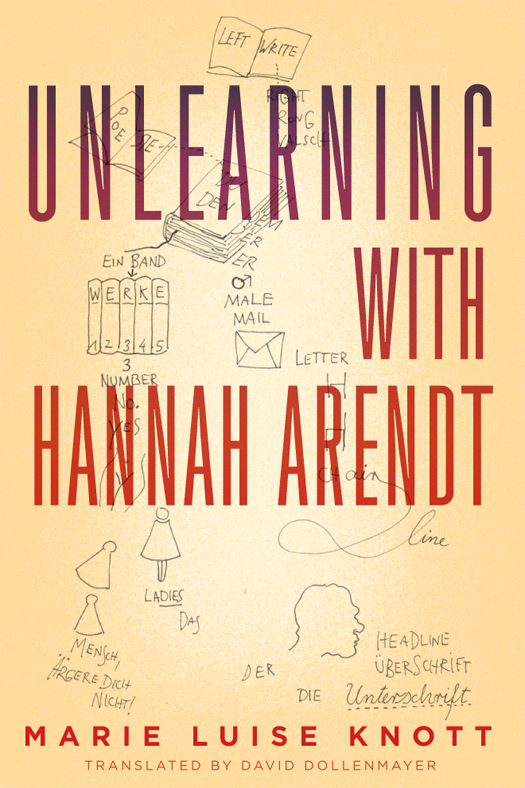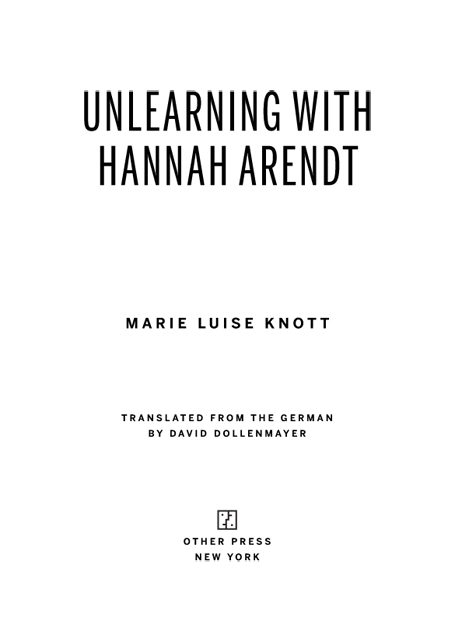Copyright 2011 MSB Matthes & Seitz Berlin Verlagsgesellschaft mbH
All rights reserved by and controlled through Matthes & Seitz Verlag Berlin. Originally published in German as Verlernen: Denkwege bei Hannah Arendt by Matthes & Seitz Berlin in 2011.
Translation copyright 2013 by David Dollenmayer
The translation of this work was funded by Geisteswissenschaften International, Translation Funding for Humanities and Social Sciences from Germany, a joint initiative of the Fritz Thyssen Foundation, the German Federal Foreign Office, the collecting society VG WORT, and the Brsenverein des Deutschen Buchhandels (German Publishers & Booksellers Association).
Excerpts from Essays in Understanding, 19301954 by Hannah Arendt. Copyright 1994 by Hannah Arendt. Reprinted by permission of Georges Borchardt, Inc., on behalf of the Hannah Arendt Bluecher Literary Trust. Excerpts from The Human Condition by Hannah Arendt. Copyright 1958 by The University of Chicago. Reprinted by permission of the University of Chicago Press.
Excerpt from Where Are the War Poets by Cecil Day Lewis, from The Complete Poems of C. Day Lewis, Stanford University Press, 1992. Copyright 1992 The Estate of C. Day Lewis. Reprinted by permission of SLL/Sterling Lord Literistic, Inc.
Illustrations by Nanne Meyer
Production Editor: Yvonne E. Crdenas
Text Designer: Julie Fry
All rights reserved. No part of this publication may be reproduced or transmitted in any form or by any means, electronic or mechanical, including photocopying, recording, or by any information storage and retrieval system, without written permission from Other Press LLC, except in the case of brief quotations in reviews for inclusion in a magazine, newspaper, or broadcast. For information write to Other Press LLC, 2 Park Avenue, 24th Floor, New York, NY 10016. Or visit our Web site: www.otherpress.com
The Library of Congress has cataloged the printed edition as follows:
Knott, Marie Luise.
[Verlernen. English]
Unlearning with Hannah Arendt / by Marie Luise Knott; translated from the German by David Dollenmayer; illustrations by Nanne Meyer.
pages cm
Includes bibliographical references.
ISBN 978-1-59051-647-8 (hardcover) ISBN 978-1-59051-648-5 (e-book)
1. Arendt, Hannah, 19061975. I . Meyer, Nanne, 1953 II . Title.
B 945. A 694 K 6613 2014
191dc23
2013047205
v3.1
FOR M.W.
CONTENTS
LAUGHTER:
THE SUDDEN TURN OF THE MIND
TRANSLATION:
THE ODDLY CIRCUITOUS PATH
FORGIVENESS:
THE DESPERATE SEARCH FOR A CONCEPT OF REALITY
DRAMATIZATION:
THE WORLD AS STAGE, THE TEXT AS SPACE
PREFACE
When someday this long affliction will have broken up, like ice, it will be spoken of as of the Black Death; and children on the heath will build a man of straw to burn delight from suffering and light from ancient dread.
Gottfried Keller
I never doubted that there must be someone like you, but now you actually exist and my extraordinary joy at that fact will last forever. Thus wrote the poet and novelist Ingeborg Bachmann after meeting Hannah Arendt in New York. It was a meeting of kindred spirits. How beautiful the last novella was with its great love, Arendt later wrote to the novelist Uwe Johnson after Bachmanns death.
In Three Paths to the Lake,for their own sake. The same is true of love, Bachmanns starting point and secret motivation. Love flares up whether impracticable or not. And although it may fail, it is inexhaustible.
The thought paths in the work of Hannah Arendt traced in the following chapters resemble Elisabeth Matreis real and metaphoric pathways. They all follow from the shock of the twentieth century: the realization that National Socialism was a force that threatened to completely redefine the essence of being human. Arendt quotes W. H. Auden:
All words like Peace and Love,
All sane affirmative speech,
Had been soiled, profaned, debased
To a horrid mechanical screech.
National Socialism attempted to force people into its own mono-causal, logical linguistic system with rigidly fixed images, to fetter them with the definitions of a totalitarian structure. All talk of the good, the true, and the beautiful (Audens Peace and Love) was degraded and defiled, drowned out by a horrid mechanical screech. How could one escape such ensnaring prejudices and come into possession of ones own language for what had been seen and heard and done? Arendt the theoretician found in Gottfried Kellers poem an image for the need to unlearn the familiar and make it again unknown. She felt that the poet said it better than she could: To burn delight from suffering and light from ancient dread.
All four chapters of this book on laughter, translation, forgiveness, and dramatization are inquiries into how Hannah Arendt awakens delight from suffering and light from ancient dread. They mark out escape routes from the dead ends of and thus of some bit of his world, one might add.
This book is about breaking loose from such bias and the territory of freedom gained thereby. The pathways of thought we will sketch have need of poetry, which in its nakedness and directness invades analytic language and allows it to open up; Arendt rejects instruments of comprehension that have proved dull or irrelevant. She allows them to go missing, unlearns them. Many things must be freed from entanglements so that we can argue about and conquer them anew. Such acts of unlearning, born of shock and distress, are intellectual awakenings. The paralyzing horror of encountering Adolf Eichmann is interrupted by laughter. Through the intellectual activity of translation, the misery of the immigrant is transformed into the insouciance of a pariah.

), her well-founded mistrust of everything that she thought she knew but that had been unable to stand up to reality, was articulated in her texts and awakened my interest. Here was someone who was seeking a new pact between language and life. Her texts were about how all events and facts, by their very existence, place a demand on our intellectual attention, even though she knew that in everyday life we dont always have the strength, time, or inclination to respond to that demand, to pause and think.
Unlike the unlearning Barbara Hahn refers to in her work on Hannah Arendt, the unlearning that runs through this book cannot be imposed upon the self, nor can it be learned. The four pathways of thought I will mark out are not the products of any plan. Instead, they are re-actions to the shock of what is purely factual. The acts of laughing, translating, forgiving, and dramatizing keep open the rift caused by that shock and keep us moving in relation to that rift.
Among the new impulses in the reception of Hannah Arendts work that let us feel more of that fresh wind mentioned above, the publication of the Denktagebuch (Intellectual diary) must be
A basic experience underlying this book is that Arendts texts are inexhaustible; they unfold more and more with each new reading. One suspects that as our present becomes ever more distant from the historical circumstances that originally gave rise to her thought, Arendts works will turn out to have new and quite different things to say to us. For each generation they hold in store (to stick to the metaphor of our epigraph) new delight and light, the delight of action and deliberation as well as a bright store of questions and images. The power of her images and concepts creates a safe place where readers can feel confident of being involved in essential intellectual processes even in the midst of their own perplexity.


